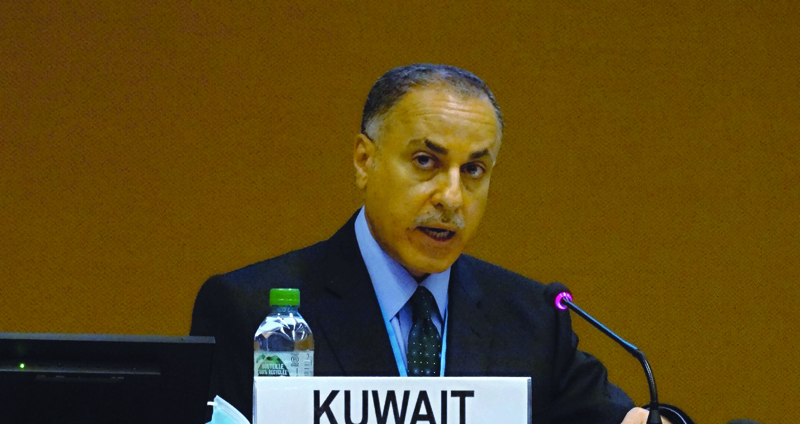GENEVA: Kuwait's development plans focused on investing in people and promoting human rights, said Kuwaiti permanent delegate to the UN Ambassador Jamal Al-Ghunaim Tuesday. This came during the discussion of Kuwait's 3rd international covenant report on Economic, Social and Cultural Rights in the United Nations' headquarter in Geneva.
Ambassador Ghunaim stressed that Kuwait has taken several measures in order to guarantee and preserve these rights, and has already been able to provide several legislative, institutional and societal guarantees for human rights. He also affirmed that Kuwait has taken a firm decision to include the 2030 sustainable development goals (SDGs) in the second plan (2015/16-2019/20) within the New Kuwait 2035 Vision, and the government's work program has been formulated under the slogan 'Towards Sustainable Development'. Furthermore, he said that the third development plan 2020-25, which was in harmony with the 2030 SDGs, included a set of programs, policies and goals related to human rights.
He noted that this plan is based on five main goals: the development of the northern region, building a knowledge economy, the development of a government that supports the sustainability of welfare, and the empowerment of citizens. It also includes nine major development programs: building an international economic zone, public privatization, strengthening an active private sector, enhancing the capabilities of citizens and institutions, developing a coherent and transparent government, developing a coherent infrastructure, developing environmentally harmonious living areas, promoting health and well-being and an effective contribution to the global community, he added.
At the same time, Ghunaim affirmed that Kuwait would continue to work on implementing the national project to support and accelerate the implementation of the fifth goal of SDGs, gender equality and women's empowerment as an expression of the vision for the 'New Kuwait 2035' vision. He also added that Kuwait is proud to be the first country in the Gulf Cooperation Council to launch the 'Women's Economic Empowerment Initiative.' The Kuwaiti ambassador pointed out that women have a prominent role in the private sector, whether they are banks' CEOs or major companies, where the percentage of women's participation in the private sector has reached 50 percent and in the government sector reached 63 percent.
The ambassador affirmed Kuwait's endeavor for the comprehensive development of the individual's personality through a distinguished educational system based on human development in all its mental, social, professional and emotional aspects. He stressed on Kuwait's interest in developing its legislation in order to enhance the protection of domestic workers, as it issued Law No 68 of 2015 regarding domestic workers and established a center for housing domestic workers in 2016.
This center received praise from the rapporteur on human trafficking, especially women and children, in cooperation with the International Organization for Migration. At the beginning of the COVID-19 pandemic, Kuwait provided a financial contribution to the World Health Organization, as well as several countries, estimated at $100 million. He also touched on the World Health Organization's Secretary-General praise during his official visit to Kuwait.
The ambassador affirmed Kuwait's commitment to cooperation with treaty bodies, special procedures and United Nations experts in the field of human rights. The International Covenant on Civil and Political Rights is a multilateral treaty adopted by United Nations General Assembly Resolution 2200A on December 16, 1966, and in force from 23 March 1976 in accordance with Article 49 of the covenant. - KUNA
.jpg)







